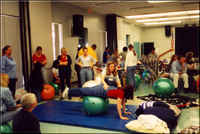|
Therapist shares teaching ‘tools’
By Cathy Willoughby
Advertiser-Tribune Staff Writer
Tiffin, Ohio
Wednesday, November 14, 2001
 They
can be seen in every classroom, jiggling in their chair or tuning out their classmates
and teachers. They
can be seen in every classroom, jiggling in their chair or tuning out their classmates
and teachers.
Rather than being bad, these children are simply more sensory sensitive than
others.
Occupational therapist Diana Henry, founder and president of Henry Occupational
Therapy Services Inc. of Arizona, shared “tools” for sensory integration
in the classroom with more than 200 teachers and therapists Tuesday morning.
They were taking part in the first part of a two-day conference at Camden Falls
titled “Sensory Integration Tool Kit,” sponsored by the Northwest Ohio
Special Education Regional Resource Center, the National Machinery Foundation
and the Ohio Regional Center for Low Incident Services for the Handicapped.
Henry posed a rhetorical question: Why is it so difficult in today’s classroom?
She responded that she is finding that schools are eliminating recess time.
She then asked her audience what their automatic response would be if someone
were walking behind them on a dark street.
“It’s fight or flight,” Henry said. “It’s an automatic
response, a survival mechanism.
When ‘Donna’ comes in the classroom, and I tell her she’s late
again, and where is your pencil, what’s going to happen to Donna? She’s
going to fly off the handle.” By studying neural biology, neural physiology
and behavior, a person can gain an understanding of how to work with students
like Donna, she said.
“You can learn to bring her back in a state of calm,” Henry said.
“By using distinctive tools for that in the classroom. Or on the bus, with
lap vests, headphones, to get to school in a calm state.”
Another problem is the use of drugs when sensory integration could either replace
or help support what medication is doing.
“For some teachers, medication is the only tool to use,” Henry said.
“But there are other tools, such as designing the classroom structure and
schedules.”
Kids are different these days, she added, suggesting some reasons for this.
“There are fewer natural foods, and more drugs,” Henry said. “There
are more restrictions on us, like seatbelts.”
Because of studies done on the causes of sudden infant death syndrome, Henry
said, parents have been told to never lay their babies on their tummies to sleep.
“Now we have children with low muscle tone,” she said. “They
have difficulties sitting in a chair and other activities. When weighing safety
issues, we need to also look at what helps development.”
Because of the lack of “tummy time”, Henry said that she has incorporated
activities in the tool kit such as “tummy on the ball.”
With more video games, computers and television, kids get less motor stimulation
than they did in the past. “That’s why schools need more playgrounds
with equipment that children can share,” Henry said.
“We need see-saws and merry-go-rounds,” she said. “We need to
spend time designing the spaces for children to play.”
“The problem with taking away playground and recess is the interaction,
where you and I learned how to socialize and share with friends,” she said.
“And we are eliminating that time.”
Although recess is often used as a reward, Henry said it should not be used
that way. Recess is an important part of everyday life, as needed as vitamins
in the child’s sensory diet.
“Motor and muscle input is vital for good development,” she said.
Physical education classes are also being reduced or eliminated because of
increased national testing.
“Parents face even more pressure,” Henry said. “The pressure
and the extra homework brings behavioral problems by increased anxiety.”
To help children get their ‘wiggles’ out, Henry used the participants
to demonstrate one of the activities in the Tool Chest handbook. After shaking
and wiggling all of their extremities, they reported feeling “invigorated
and ready to deal with something.”
Henry said educators need to understand how the senses affect student learning
and behavior.
Return to Articles Index Page
Henry OT Services, Inc
4000 Pipit Place, Flagstaff, AZ 86004
E-Mail: rick@henryot.com
|

